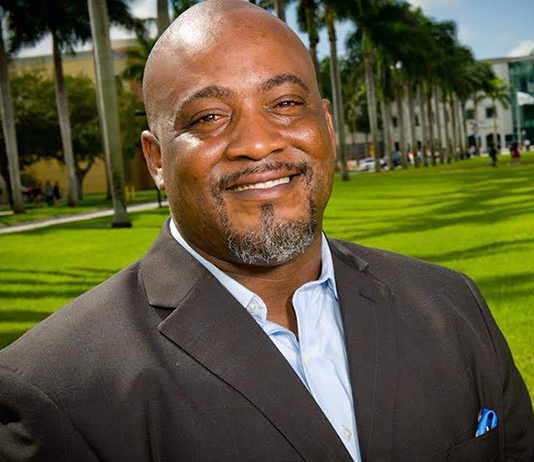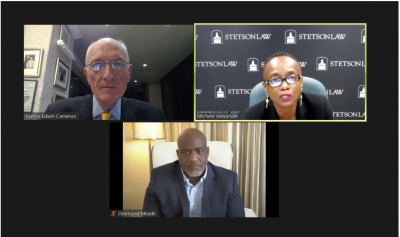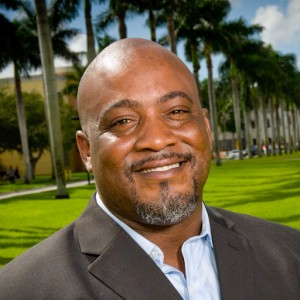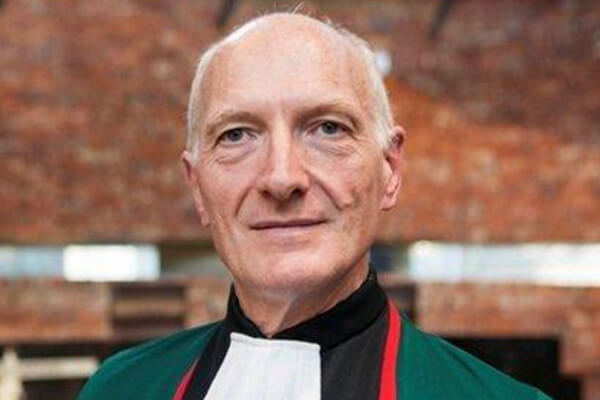Stetson Law honors Desmond Meade with public service award

Desmond Meade received the Wm. Reece Smith, Jr. Public Service Award during the annual Inns of Court event held virtually on Feb. 22, 2021.
The prestigious Wm. Reece Smith, Jr. Public Service Award recognizes individuals who have provided outstanding contributions to public service, the justice system, and the community.
During his acceptance speech, Meade shared how in 2005 he was a convicted felon, homeless, and addicted to drugs. He was tired of struggling and contemplated taking his own life. Instead, he found the strength to seek help and began rebuilding his life. By 2014, he had earned a law degree from Florida International University College of Law.
Meade became the president of the Florida Rights Restoration Coalition (FRRC) and chair of Floridians for a Fair Democracy. He led the FRRC to a historic victory in 2018 with the successful passage of Amendment 4, a grassroots citizen’s initiative that restored voting rights to over 1.4 million Floridians with past felony convictions. Amendment 4 represented the single largest expansion of voting rights in the United States in half a century.

The overarching philosophy that drives Meade’s work and life is to always strive to find something within himself to give back for the betterment of others. People who appear to have nothing in life but who are joyful are so because they share what they have with others, he said.
“If we empower the weakest in our community, we empower the community as a whole,” Meade said during his acceptance speech.
And in that, Meade truly embodies the spirit of his award’s namesake – William Reece Smith, Jr., a legendary Florida lawyer who dedicated more than 60 years working to increase the legal services available to people who could not afford them.
“I honor you for your work in every way,” Justice Edwin Cameron told Meade during the event, adding that he found every part of Meade’s presence at the ceremony – from his survival, return to citizenship, and work accomplished – deeply moving.
Cameron was the keynote speaker who delivered The William Reece Smith Jr. Distinguished lecture in Ethics. A South African judge and human rights lawyer, his speech addressed the “moral catastrophe” of mass incarceration, calling it a “deadly epidemic” that leads to reduced life expectancy, higher infant mortality, and higher rates of severe illness in the affected population, which is disproportionately composed of Blacks and other minorities.
He examined the issue from both South Africa’s history with apartheid and America’s history with slavery. Both democracies face threats to the rule of law, and the deep scars of racial injustice still reverberate. While the United States has the highest incarceration rate in the world, South Africa is not far behind at the 12th highest rate. Both countries have responded to rising crime rates with misguided efforts for law and order, including the “war on drugs” rallying cry, to impose long and harsh sentences.
Using the blunt instrument of law and punishment to address what, in many cases, are public health issues, is what Cameron meant by “misguided efforts.” He said that prison reform is a hopeless concept without also making a profound commitment to social reform.
“Why do we turn our gaze from the horrors of prisons?”
Cameron gave four reasons:
- Hannibal Lecter syndrome – The notion that some people are truly dangerous and should be imprisoned.
- Genuine fear of crime and damage to what is precious to us – For example, South Africa has one of the highest violent crime rates, and citizens are truly afraid.
- Genuinely perplexed about crime – There is no consensus on the main motivators behind it, therefor making the root causes difficult to definitively identify and address.
- If society’s institutions of governance fail to address crime in some fashion, citizens will resort to retribution themselves – In South Africa, he said, vigilante/mob justice murders are an issue.
We must be careful of social conundrums we don’t fully understand, Cameron said, but mass incarceration is not the answer. Prison abolition demands better, more practical answers to bigger issues such as livable wages, clean water, affordable housing, mental illness, and health care, he said.
About Inns of Court
The Inns of Court is a tradition used to train barristers in London that focuses on maintaining close mentoring relationships between lawyers-to-be and eminent scholars, lawyers, and judges. Local dignitaries, federal, circuit and county judges, Tampa Bay lawyers, area Inns of Court members and Stetson students, faculty and staff are invited to attend the virtual event.
-Ashley McKnight-Taylor
[email protected]





